If you wish to inform us of malicious actions witnessed or are in need of help
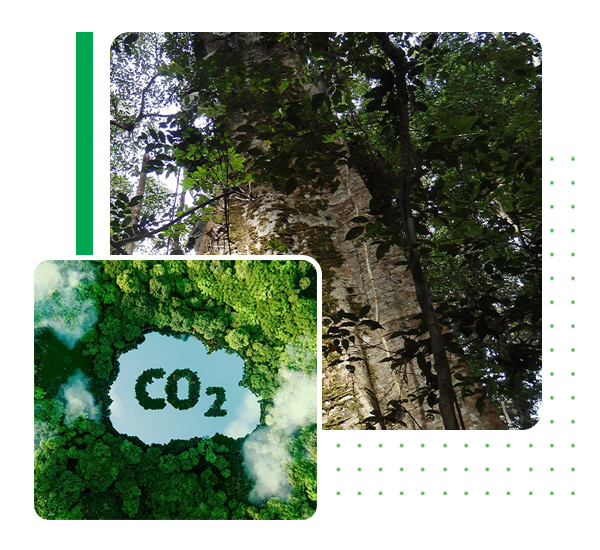
At SIPH, we are convinced that we have a role to play in the fight against global warming. This is why since 1997, we have made the environmental subject a major focus of our sustainable development policy.
Because it is essential to act, to evaluate and quantify our impact, we regularly measure our GHG emissions on our rubber operations in Côte d'Ivoire, Ghana, Liberia, and Nigeria, from the value chain ranging from plantations through to factory processing and export to international markets.

Emissions reporting follows the Product Life Cycle Assessment methodology established by the Green House Gas (GHG) Protocol. The emissions calculator we use was developed by MEO Carbon Solutions, an environmental consulting company, in collaboration with our industrial partners SOCFIN and Michelin.
Download the full press releaseSIPH has been committed to a ZERO DEFORESTATION and ZERO BURNING approach since 2016 and follows the HCV/HCS (High Conservation Value / High Carbon Stock) methodology for all its extensions. Emissions related to land use change during the creation of our industrial plantations are therefore not considered in this 2023 report, nor are emissions related to historical changes in land use by small growers with whom we buy our rubbers.
Our total emissions per ton of natural rubber produced in 2023 = 362 CO2 equivalent per T.
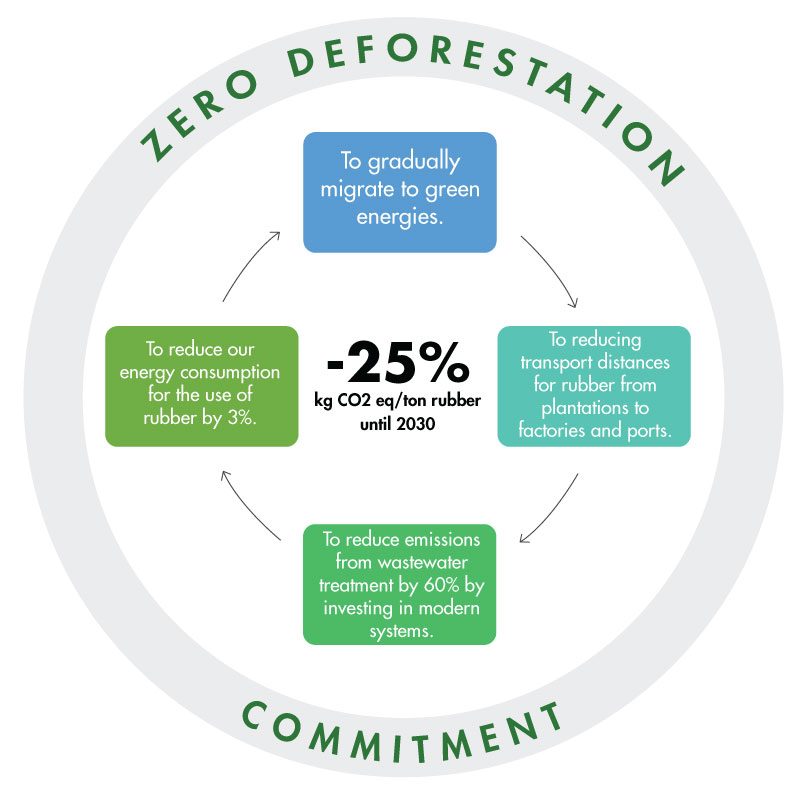
To reduce the environmental impact generated by our activity, since 2019 we have implemented a plan to drastically reduce the use of phytosanitary products and chemical fertilizers in plantations. These initiatives have enabled the storage in the soil of around 50 T of CO2/ha.
We are continuing this responsible management by reducing by 2030 approximately 20% of the use of fossil fuels when replanting our rubber plots and 3% per year of energy consumption in our factories in transformation.
Calculations also showed that our machining effluent treatment systems are the source of nearly 11% of greenhouse gas (GHG) emissions. This is why it seems urgent to us to reduce these emissions, by capturing the methane emitted and by moving towards modern systems such as activated sludge.
Rubberwood at the end of its life is already transformed into chips to fuel boilers or recycled into lumber, following the example of the SAPH BONGO integrated farm unit in Côte d'Ivoire.
A gradual plan to replace high CO2-emitting electricity sources with green options has been initiated, and solar power generation pilots will be installed on our sites by 2025.
A working group has been set up to rethink our method of transporting rubber. This implies favoring modes with low CO2 emissions for our movements of rubber, from the plantations to the factories, and from the factories to the ports of embarkation.
The European Union Deforestation-free Regulation (EUDR) is a significant policy initiative by the European Union to curb deforestation globally. This regulation aims to ensure that products entering the EU market do not contribute to deforestation and forest degradation. EUDR plays a critical role in promoting the consumption of deforestation-free products. This means that the products must be composed of, fed with, or manufactured using commodities produced on lands that have not been cleared of forests for agricultural purposes. By doing so, the regulation seeks to minimize the EU's impact on global forest resources, reduce greenhouse gas emissions caused by deforestation, and support the ongoing battle against biodiversity loss across the planet.
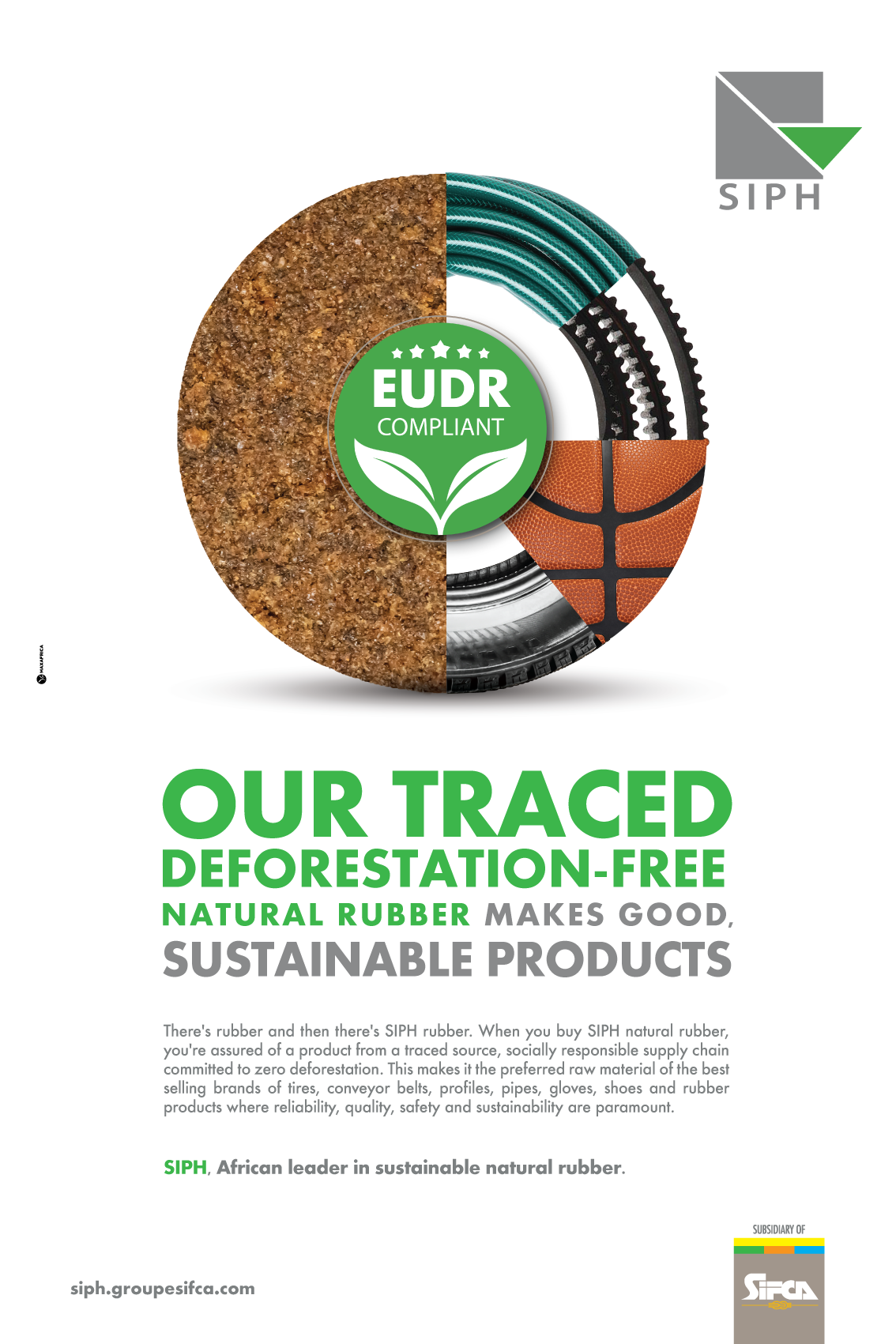
The importance of EUDR can be summarized as follows:
Global Impact: It extends beyond the EU, aiming to reduce deforestation caused by forestry and agricultural activities worldwide.
Environmental Protection: Forms part of a comprehensive EU strategy to safeguard global forests, dovetailing with other regulations like the EU Timber Regulation and the Forest Law Enforcement, Governance, and Trade (FLEGT) Regulation.
Climate Change Mitigation: By ensuring that products are deforestation-free, the EUDR contributes significantly to reducing greenhouse gas emissions, which is vital in the fight against climate change.
Biodiversity Conservation: It helps to preserve biodiversity by preventing the loss of forest habitats, which are crucial for the survival of many species. By implementing EUDR, SIPH is taking a firm stand against deforestation, sending a strong message about the importance of environmental stewardship and sustainable development. This regulation benefits the environment and sets a standard for responsible trade and consumption practices globally.
Human rights: Deforestation is often linked with exploitative labor practices, including forced labor and child labor. The EU regulation can help improve labor standards in forestry and agriculture by promoting sustainable and ethical practices in these industries.
Economic importance,
Social importance,
Environmental importance: cultivation is environmentally friendly
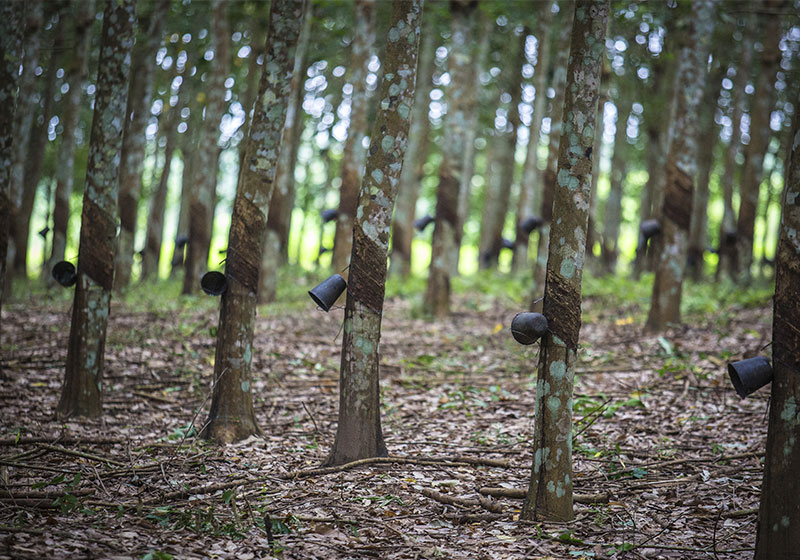

SIPH constantly maintains its efforts in environmental and natural resources preservation. Early 2016, the Company set itself a certain number of goals and rules relative to activities to preserve the environment and natural resources in accordance with the standards of good practice in plantation management. This commitment is enshrined in the updated sustainability policy, formalized by management in November 2017, which must be respected by its employees as well as by other relevant stakeholders working for the company.

The Sustainable Development Manager of SIPH is responsible for coordinating sustainability activities and relies on subsidiary SD managers and management in general, which carries and sets out the commitments made. The purpous is to create synergies capable of understanding and implementing broad principles of sustainability, such as social, economic, environmental… which encompass all aspects of the company's activities. The development of the team, as well as the awareness of all stakeholders in the company, continues to be carried out, in quality and quantity, in a planned manner through the individual development plan and planning. The sustainability team is continuously improving all aspects to ensure the sustainability of the business.

Discover

SIPH’s main activity is the production and marketing of natural rubber. SIPH’s rubber plantations are all in West Africa. Natural rubber remains indispensable for the tyre industry.
MoreIf you wish to inform us of malicious actions witnessed or are in need of help
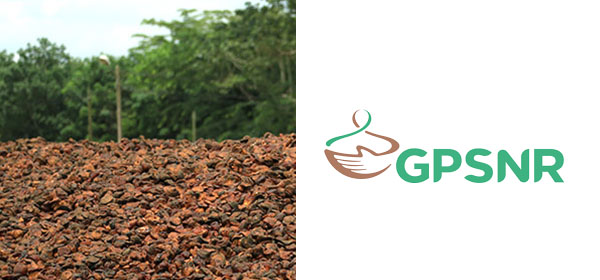
SIPH, as a member of the GPSNR, must ensure that its operations comply with GPSNR requirements, including having a 3r party verified Due Diligence process in place by 2027.
This commitment highlights our Group’s strong willingness to actively contribute to the sustainability of the African and global rubber industry and to the effective functioning of the GPSNR as a founding member. SIPH maintains an active participation in various Workgroup and Taskforces of GPSNR with 5 high level Managers.